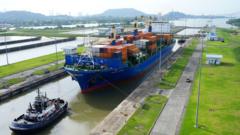A Hong Kong-based conglomerate has entered discussions to divest a significant portion of its interest in crucial Panama Canal ports to a consortium led by BlackRock, a prominent US investment firm. This development emerges in the context of heightened anxiety regarding perceived Chinese dominance of the vital maritime trade route, particularly following remarks from former President Donald Trump suggesting a need for US oversight.
CK Hutchison Holding, through its subsidiary, manages terminals at both the Atlantic and Pacific entrances of the canal. The decision to sell is encapsulated in a massive $22.8 billion deal that spans 43 ports across 23 nations, including the pivotal terminals within Panama. The transaction must be authorized by Panamanian authorities before it can proceed.
The Panama Canal, a transformative engineering feat completed in the early 1900s, facilitates the transit of about 14,000 vessels annually, carrying diverse cargo such as natural gas, automobiles, and military supplies. Although the US held administrative control over the canal until 1977, it gradually restored sovereignty to Panama, which fully claimed control in 1999.
Trump's administration highlighted the canal as a sphere of US interest, voicing concerns that Chinese involvement in port management poses a significant national security risk. In February, US Secretary of State Marco Rubio called on Panama to mitigate what he deemed an excessive Chinese influence over the canal operations.
In response, the Panamanian government has firmly rebutted such claims, asserting its sovereign right over the canal. President Jose Raul Mulino reiterated that the waterway "is and will remain" under Panamanian jurisdiction. Meanwhile, Frank Sixt, co-managing director of CK Hutchison, emphasized that the agreement was strictly a commercial transaction, dismissing any connections to political narratives surrounding the Panama Canal.
The consortium acquiring the ports also includes Terminal Investment Limited, a Swiss logistics company, further underscoring the international nature of cargo port ownership and investment amidst evolving geopolitical landscapes.


















